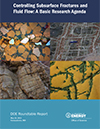SC-Sponsored Reports
Provided below is a listing of DOE Office of Science workshop reports that address Energy Earthshots with research directions relevant to the Office of Science.
Hydrogen Shot

Basic Energy Sciences Roundtable on Foundational Science for Carbon-Neutral Hydrogen Technologies
This report is based on a BES Roundtable on Foundational Science for Carbon-Neutral Hydrogen Technologies that was held August 2-5, 2021. The roundtable was organized by the office of Basic Energy Sciences in coordination with the offices of Energy Efficiency and Renewable Energy, Fossil Energy and Carbon Management, and Nuclear Energy. The goal of the roundtable was to identify the basic science priority research opportunities (PROs) that could enable a carbon-neutral, hydrogen-based energy and chemical infrastructure. The roundtable participants were informed by the Technology Status Document, which overviewed the limitations and challenges of selected technologies for hydrogen production, storage and transport, and utilization.
JPG | Brochure | Report | Technology Status Document
Long Duration Storage Shot

BASIC RESEARCH NEEDS WORKSHOP ON NEXT GENERATION ELECTRICAL ENERGY STORAGE
This report is based on a BES workshop on Basic Research Needs for Next Generation Electrical Energy Storage, which was held on March 27-29, 2017. The workshop goal was to define priority research directions that outline scientific advances to usher in a new era of electrochemical energy storage with significantly higher performance, lower cost, greater reliability, and increased safety.
JPG | PDF file of this Report | (Low Res) | Brochure | Factual Document
Carbon Negative Shot
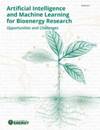
Artificial Intelligence and Machine Learning for Bioenergy Research
The integration of artificial intelligence and machine learning (AI/ML) with automated experimentation, genomics, biosystems design, and bioprocessing represents a new data-driven research paradigm poised to revolutionize scientific investigation and, particularly, bioenergy research. To identify the opportunities and challenges in this emerging research area, BER and EERE/BETO held a workshop on AI/ML for Bioenergy Research (AMBER) on August 23-25, 2022. Experts met to assess the current and future potential for AI/ML and laboratory automation to advance biological understanding and engineering. Participants examined how integrating AI/ML tools with laboratory automation could accelerate biosystems design and optimize biomanufacturing for a variety of DOE mission needs in energy and the environment.
PDF
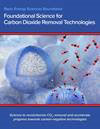
Foundational Science for Carbon Dioxide Removal Technologies
In March 2022, the US Department of Energy Office of Basic Energy Sciences, in coordination with the DOE Technology Offices of Energy Efficiency and Renewable Energy, Fossil Energy and Carbon Management, and Advanced Research Projects Agency-Energy (ARPA-E), convened a roundtable on “Foundational Science for Carbon Dioxide Removal Technologies” to discuss the scientific and technical barriers for dilute carbon dioxide capture, conversion, and storage. The roundtable identified 5 priority research opportunities that could address these scientific and technical challenges and accelerate progress toward the realization of zero carbon emissions.
JPG | Brochure

Basic Research Needs for Carbon Capture: Beyond 2020
This report is based on a SC/FE workshop on Carbon Capture: Beyond 2020, held March 4–5, 2010, to assess the basic research needed to address the current technical bottlenecks in carbon capture processes and to identify key research priority directions that will provide the foundations for future carbon capture technologies. (more)
JPG | PDF file of this of report

Carbon Cycling and Biosequestration
To develop research objectives in biological carbon cycling and biosequestration of carbon in ecosystems, BER hosted the Carbon Cycling and Biosequestration Workshop in March 2008. Experts in terrestrial and ocean biogeochemical cycling, ecosystem science, research technology development, molecular biology, and modeling met to identify research needs and opportunities for understanding biological carbon cycling and biosequestration. Participants also assessed current science and technology and discussed fundamental research for pursuing BER goals. This report outlines the workshop’s findings and highlights key opportunities for research on biological aspects of the global carbon cycle.
Enhanced Geothermal Shot
Controlling Subsurface Fractures and Fluid Flow: A Basic Research Agenda
The Office of Science, through its Office of Basic Energy Science (BES), convened a roundtable consisting of 15 national lab, university and industry geoscience experts to brainstorm basic research areas that underpin the goals of the broader SubTER Technology Team efforts, and are currently underrepresented in the BES research portfolio. The roundtable participants developed a basic research agenda that is detailed in this report. (more)
JPG | PDF file of this Report
Floating Offshore Wind Shot

Basic Research Needs Workshop for Microelectronics
This report is based on a workshop on Basic Research Needs for Microelectronics, which was held October 23–25, 2018, and sponsored by ASCR, BES, and HEP. The goal of the workshop was to identify basic research needs associated with advanced microelectronics technologies for applications relevant to the DOE mission, including computing, power grid management, and science facility workloads.
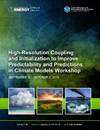
High-Resolution Coupling and Initialization to Improve Predictability and Predictions in Climate Models
There is a growing demand for reliable high-resolution, coupled-climate information in two communities: the predictions and projections communities. Recognizing the common challenges and capitalizing on the potential synergies, the Regional and Global Climate Modeling program within the BER and National Oceanic and Atmospheric Administration (NOAA) jointly hosted a workshop titled High-Resolution Coupling and Initialization to Improve Predictability and Predictions in Climate Models, held September 30-October 2, 2015. This workshop brought together two groups of scientific experts: one focused on sub-seasonal-to-seasonal climate predictions and the other focused on using initialized simulations to identify biases in climate models, such as in the Cloud Associated Parameterization Testbed.
PDF
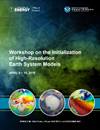
Initialization of High-Resolution Earth System Models
From weather to climate timescales, weeks to decades, societal needs require detailed predictions of the atmosphere, ocean, and land-surface to facilitate informed planning. Central to this scientific endeavor is the ability to accurately initialize the earth system models (ESMs), since frequently the skill in forecasts, predictions, and projections depends on the quality of the initialization. However, initialization of high-resolution ESMs remains an outstanding challenge, particularly for the climate modeling community where initialization has received relatively less attention and where longer-term information is needed. This need led BER and National Oceanic and Atmospheric Administration (NOAA) to host a workshop held April 9-10, 2018, that focused exclusively on the opportunities that data assimilation and, specifically, coupled data assimilation might provide to the ESM enterprise with particular attention toward initialization. It was composed of seven sessions, each with a distinct topical theme that related to the broad challenge of initializing high-resolution ESMs.
PDF

Artificial Intelligence for Earth System Predictability (AI4ESP)
BER and ASCR hosted a workshop Artificial Intelligence for Earth System Predictability (AI4ESP) Workshop on several days in October-November 2021, hosted by BER and ASCR. The workshop is part of BER-ASCR’s ambition to more radically and aggressively advance prediction capabilities in the climate, Earth, and environmental sciences using modern data analytics and artificial intelligence (AI). Advances in these capabilities are needed to improve predictions of climate change and extreme events that provide actionable information for planning and building resilience to their impacts.
PDF
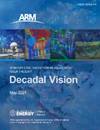
2020 ARM Decadal Vision
The Atmospheric Radiation Measurement (ARM) user facility was established in 1989 by BER to provide an observational basis for studying the Earth’s climate. ARM began collecting observations in 1992 and was designated a user facility in 2003. The facility includes a network of extensively instrumented long-term fixed-location observatories and mobile facilities. The ARM facility also includes an aerial component to augment these ground-based measurements. Because of the diversity of in situ and remotely obtained observations, ARM’s data management infrastructure is designed to collect, process, and deliver data to the research community. Through community engagement, ARM in 2020 developed a new Decadal Vision document to address increasingly complex science challenges related to the facility’s mission over the next five to 10 years. The updated vision statement is to provide the research community with the best array of field observations and supporting state-of-the-art data analytics to significantly improve the representation of challenging atmospheric processes in earth system models.
PDF
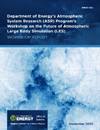
Future of Atmospheric Large Eddy Simulation (LES)
Large-eddy simulation (LES) is a modeling approach that solves spatially filtered equations of fluid motion and explicitly simulates the scales of turbulence larger than the filter scale. The use of LES will expand as computational resources continue to grow, enabling the application of LES to simulate a broader range of processes and scales. It is these important roles filled by LES that motivated the creation of BER’s Atmospheric System Research Program’s Workshop on the Future of Atmospheric Large-Eddy Simulation (LES), which was held April 25-26, 2022, with the purpose of leveraging the expertise of LES developers, process modelers, and observationalists to identify the current state of the science, the most pressing research challenges, and pathways forward that may prove valuable to progressing the science.
PDF
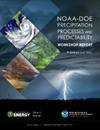
NOAA and DOE-BER, in partnership with the U.S. Global Change Research Program (USGCRP) and U.S. Climate Variability and Predictability Program (US CLIVAR), jointly organized a community workshop during November 30-December 2, 2020, focused on advancing understanding of precipitation predictability and processes and exploring ways to reduce precipitation biases. The workshop scope considered precipitation processes and predictability over the contiguous U.S. in the context of global models, with a focus on sub-seasonal to multi-decadal timescales.
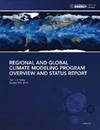
There are several projects within the Earth and Environmental Systems Modeling program that have the overall of focus of quantifying and enhancing a predictive, process-level, and decision-relevant understanding of Variability and Change in the Earth system. This is done by advancing capabilities to design, simulate, evaluate, diagnose, and analyze global and regional earth system models informed by observations. Many of the overarching goals of these projects are listed in the corresponding report.
Industrial Heat Shot

Basic Research Needs Workshop for Transformative Manufacturing
This report is based on a Basic Research Needs workshop for Transformative Manufacturing that was held March 9 -11, 2020. The focus of the workshop was to identify the basic science priority research directions (PRDs) that could accelerate innovation to transform manufacturing in the future. The identified PRDs provide a basic science strategy that underpins applied technology research. As manufacturing processes become increasingly data driven and fully networked, integration of autonomous sensing and control will enable greater productivity and competitiveness, requiring co-design of systems driven by science. Scientific advances will also support the design of circular processes that minimize waste and reduce the use of critical materials. Research based on these priorities will lay the scientific foundation to go beyond incremental improvements to create new, transformative technologies for manufacturing that are energy efficient and sustainable.
JPG | Brochure | Report | Factual Document

BASIC RESEARCH NEEDS WORKSHOP ON SYNTHESIS SCIENCE FOR ENERGY RELEVANT TECHNOLOGY
This report, which is the result of the Basic Energy Sciences Workshop on Basic Research Needs for Synthesis Science for Energy Technologies, lays out the scientific challenges and opportunities in synthesis science. (more).
JPG | PDF file of this Report | Brochure

Sustainable Ammonia Synthesis – Exploring the scientific challenges associated with discovering alternative, sustainable processes for ammonia production
The Office of Science, through its Offices of Basic Energy Science (BES) convened a roundtable, held on February 18, 2016. Participants in the Roundtable discussions concluded that the scientific basis for sustainable processes for ammonia synthesis is currently lacking, and it needs to be enhanced substantially before it can form the foundation for alternative processes. The Roundtable Panel identified an overarching grand challenge and several additional scientific grand challenges and research opportunities:. (more).
Clean Fuels and Products Shot

Basic Energy Sciences Roundtable on Chemical Upcycling of Polymers
This report is based on a BES Roundtable on Chemical Upcycling of Polymers, which was held April 30-May 1, 2019. The goal of the roundtable was to identify the fundamental challenges and research opportunities that could transform discarded plastics into higher value fuels, chemicals, and materials.
JPG Brochure | Report | Factual Document

Basic Energy Sciences Roundtable on Liquid Solar Fuels
This report is based on a BES Roundtable on Liquid Solar Fuels, which was held August 20-21, 2019. The goal of the roundtable was to identify research opportunities to overcome scientific and technical barriers in the generation of liquid solar fuels via artificial photosynthesis.
JPG | Brochure | Report | Factual Document
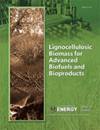
Lignocellulosic Biomass for Advanced Biofuels and Bioproducts To assess the current state of the science regarding lignocellulosic biofuels and identify remaining basic research challenges in establishing a viable domestic biofuels and bioproducts industry, DOE’s Office of Biological and Environmental Research convened the Bioenergy Workshop on June 23-24, 2014, in Washington, D.C. The workshop brought together experts from industry, academia, and DOE national laboratories and included presentations and breakout discussions organized around the themes of (1) biomass development, (2) lignocellulose deconstruction, (3) specialty fuels, and (4) bioproduct development from biomass.
Crosscutting Energy Earthshot Resources

Basic Energy Sciences Roundtable on Producing and Managing Large Scientific Data with Artificial Intelligence and Machine Learning
This report is based on a BES Roundtable on Producing and Managing Large Scientific Data with Artificial Intelligence and Machine Learning, which was held October 22-23, 2019. The goal of the roundtable was to identify coordinated, long-term AI/ML research challenges that will drive major advances in neutron, photon, and nano-based sciences.
JPG | Brochure | Report | Status Document

BES at 40: A REMARKABLE RETURN ON INVESTMENT IN FUNDAMENTAL RESEARCH
This report by the Basic Energy Sciences Advisory Committee (BESAC) is intended to highlight outstanding examples of major scientific accomplishments emerging from 40 years of BES research support, including how these discoveries have helped fulfill the Department of Energy’s mission and have led to new technologies and industries that contribute to American innovation and prosperity. By examining past successes, this report seeks to illuminate guiding strategies and approaches that will be critical to ensuring future U.S. leadership.
Individual stories: Biology and Biomedicine | Chemical Industry | HPC | Innovative Materials | Millie Dresselhaus | Nanoscience | Nuclear Waste | Quantum Computing | Semiconductors|
User Facilities | Superconductivity | Tough Stuff
Link to Short Summaries

ASCR@40 : Four Decades of Department of Energy Leadership in Advanced Scientific Computing Research
In December 2017, the Advisory Committee for DOE’s Office of Advanced Scientific Computing Research (ASCR) was asked to document some of the major impacts of ASCR and its predecessor organizations. This seemingly simple request kicked off a multi-year process of information gathering, distilling, curating, and refining. Input was provided by over 100 scientists.
Individual Story Summaries: Petaflops for the People | Building the Computational Workforce | Supporting Science through Open-Source Software | World-Leading Computing Facilities | Building Better Computers | Overcoming Scaling Challenges | Making Sense of Big Data | Grid Computing For High-Speed Collaboration | Moving Big Data | Uncertainty Quantification | Applying Equations to Complex Problems | Modeling and Simulation

BASIC RESEARCH NEEDS WORKSHOP FOR CATALYSIS SCIENCE
This report is based on a BES workshop on Basic Research Needs for Catalysis Science to Transform Energy Technologies, which held on May 8-10, 2017. The purpose of the workshop was to identify basic research needs for catalytic processes that underpin energy resource conversion or utilization, with a focus on new and scientifically challenging areas that have the potential to significantly impact science and technology.
JPG | PDF of this Report | Brochure | Factual Document

BASIC RESEARCH NEEDS WORKSHOP ON INNOVATION AND DISCOVERY OF TRANSFORMATIVE EXPERIMENTAL TOOLS
This report is based on a BES workshop on Basic Research Needs for Innovation and Discovery of Transformative Experimental Tools, which was held on June 1-3, 2016. The workshop goal was to define priority research directions for the instruments and associated techniques needed to address grand challenges in energy sciences.
JPG | PDF file of this Report | Brochure

BES COMPUTING AND DATA REQUIREMENTS IN THE EXASCALE AGE
The DOE SC Exascale Requirements Review for Basic Energy Sciences brought together key computational domain scientists and DOE planners and administrators to determine the requirements for an exascale ecosystem that includes computation, data analysis, software, workflows, HPC services, and the full range of computer requirements to support forefront scientific research in basic energy science through 2025. (more).

BASIC RESEARCH NEEDS WORKSHOP ON Quantum Materials for Energy Relevant Technology
This report is based on a BES workshop on Basic Research Needs on Quantum Materials for Energy Relevant Technology, which was held on February 8-10, 2016. The workshop goal was to define priority research directions that would lay the foundation to better understand quantum materials and harness their rich technological potential. (more).
JPG | PDF file of this Report | Brochure

Computational Materials Science and Chemistry:
Accelerating Discovery and Innovation through Simulation-Based Engineering and Science
This report is based on a SC Workshop on Computational Materials Science and Chemistry for Innovation on July 26–27, 2010, to assess the potential of state-of-the-art computer simulations to accelerate understanding and discovery in materials science and chemistry, with a focus on potential impacts in energy technologies and innovation. (more)


